Data Collection: 'Harvesting' Personalities Online - IT Ethics Report
VerifiedAdded on 2022/12/23
|7
|1635
|99
Report
AI Summary
This report examines the ethical implications of data collection, specifically focusing on the case of "Harvesting Personalities Online." The assignment analyzes the case through the lens of four classical ethical theories: utilitarianism, deontology, contract theory, and virtue ethics. It explores how the practice of gathering personal data to tailor campaign messages raises ethical concerns, particularly when individuals are unaware of this data collection. The report identifies the issues from each ethical perspective and provides recommendations to address the ethical issues of data collection. The analysis considers the lack of transparency, potential for manipulation, and the overall impact on individual autonomy and societal well-being. The student's work highlights the importance of informed consent, data confidentiality, and responsible data practices within the context of IT ethics.
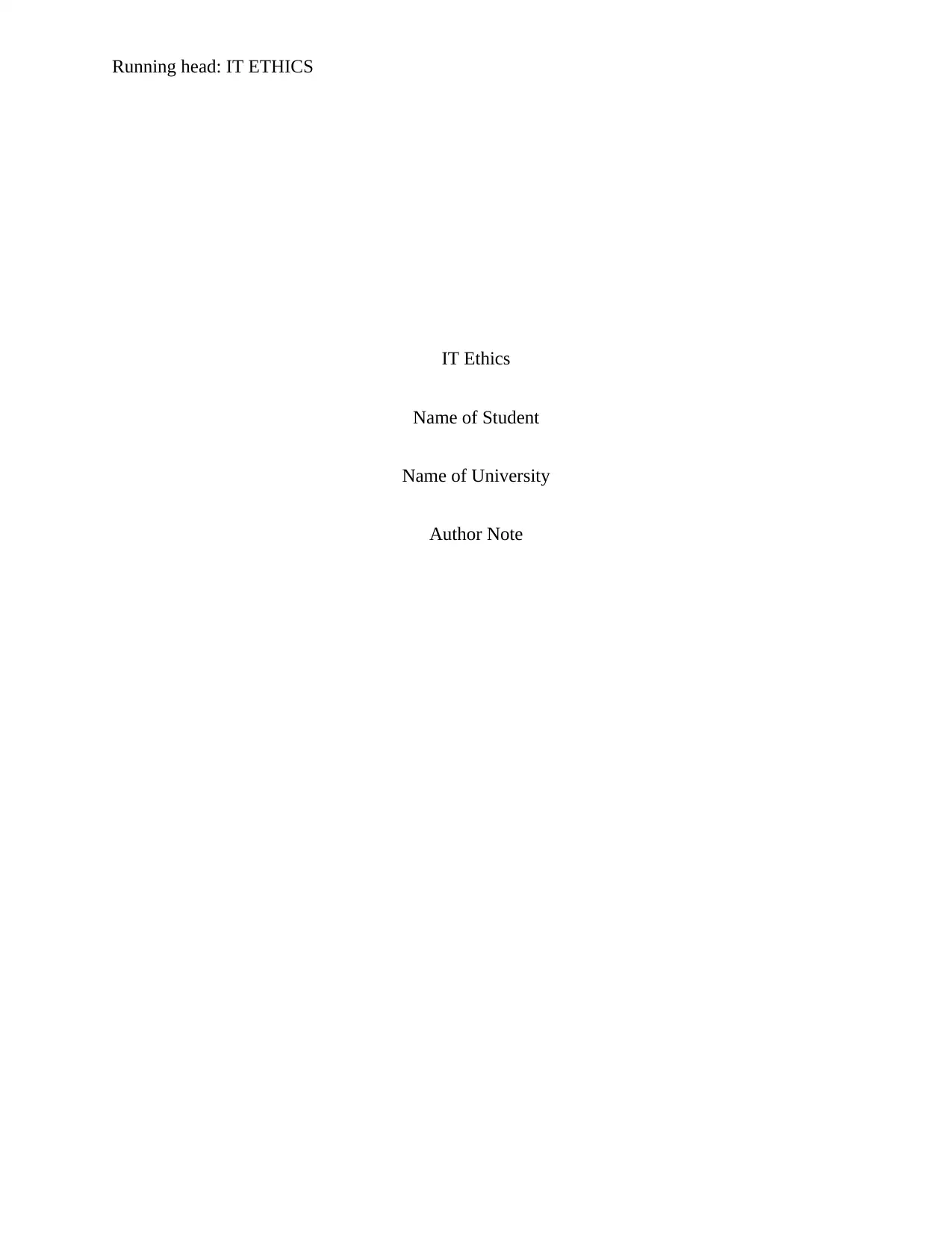
Running head: IT ETHICS
IT Ethics
Name of Student
Name of University
Author Note
IT Ethics
Name of Student
Name of University
Author Note
Paraphrase This Document
Need a fresh take? Get an instant paraphrase of this document with our AI Paraphraser
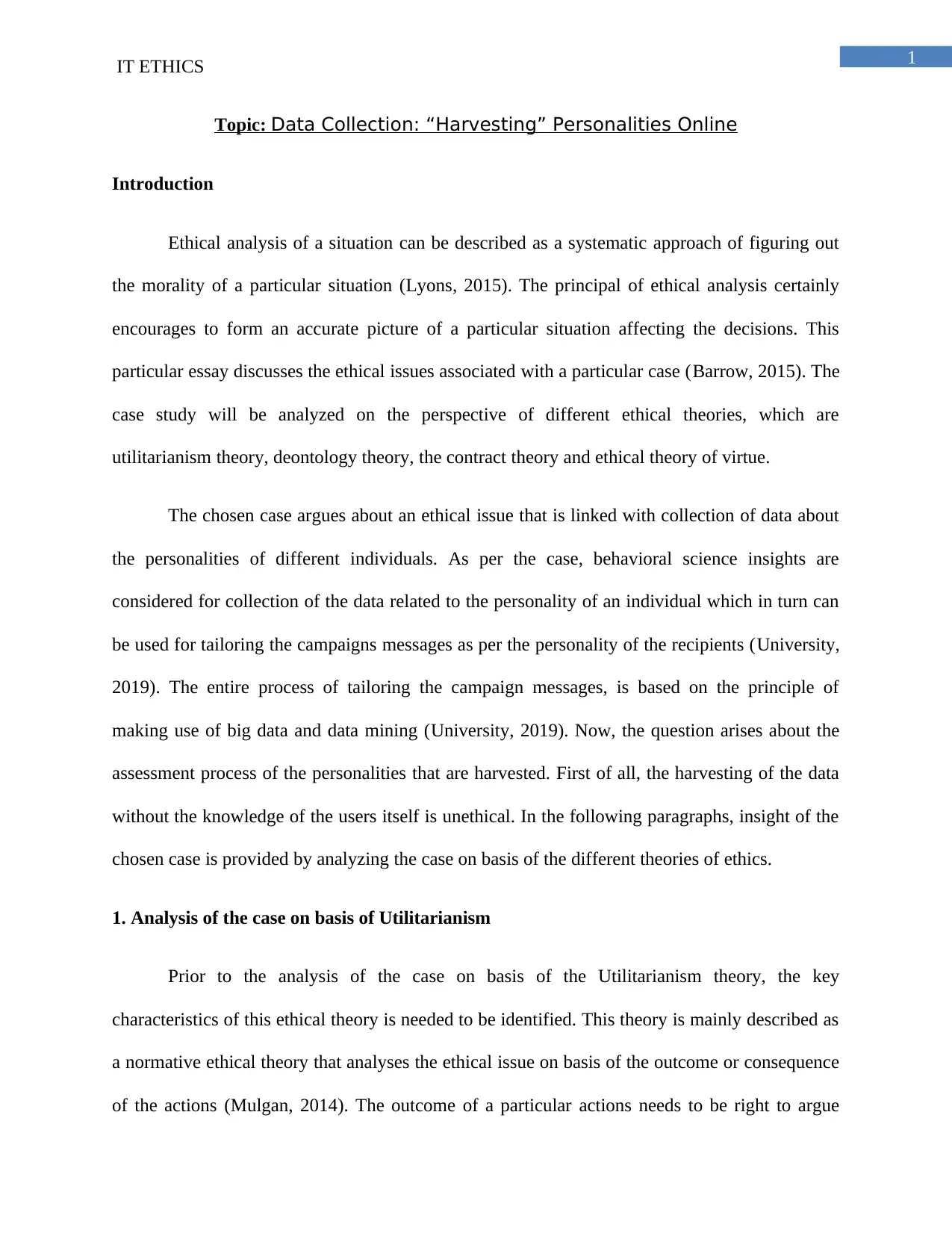
1IT ETHICS
Topic: Data Collection: “Harvesting” Personalities Online
Introduction
Ethical analysis of a situation can be described as a systematic approach of figuring out
the morality of a particular situation (Lyons, 2015). The principal of ethical analysis certainly
encourages to form an accurate picture of a particular situation affecting the decisions. This
particular essay discusses the ethical issues associated with a particular case (Barrow, 2015). The
case study will be analyzed on the perspective of different ethical theories, which are
utilitarianism theory, deontology theory, the contract theory and ethical theory of virtue.
The chosen case argues about an ethical issue that is linked with collection of data about
the personalities of different individuals. As per the case, behavioral science insights are
considered for collection of the data related to the personality of an individual which in turn can
be used for tailoring the campaigns messages as per the personality of the recipients (University,
2019). The entire process of tailoring the campaign messages, is based on the principle of
making use of big data and data mining (University, 2019). Now, the question arises about the
assessment process of the personalities that are harvested. First of all, the harvesting of the data
without the knowledge of the users itself is unethical. In the following paragraphs, insight of the
chosen case is provided by analyzing the case on basis of the different theories of ethics.
1. Analysis of the case on basis of Utilitarianism
Prior to the analysis of the case on basis of the Utilitarianism theory, the key
characteristics of this ethical theory is needed to be identified. This theory is mainly described as
a normative ethical theory that analyses the ethical issue on basis of the outcome or consequence
of the actions (Mulgan, 2014). The outcome of a particular actions needs to be right to argue
Topic: Data Collection: “Harvesting” Personalities Online
Introduction
Ethical analysis of a situation can be described as a systematic approach of figuring out
the morality of a particular situation (Lyons, 2015). The principal of ethical analysis certainly
encourages to form an accurate picture of a particular situation affecting the decisions. This
particular essay discusses the ethical issues associated with a particular case (Barrow, 2015). The
case study will be analyzed on the perspective of different ethical theories, which are
utilitarianism theory, deontology theory, the contract theory and ethical theory of virtue.
The chosen case argues about an ethical issue that is linked with collection of data about
the personalities of different individuals. As per the case, behavioral science insights are
considered for collection of the data related to the personality of an individual which in turn can
be used for tailoring the campaigns messages as per the personality of the recipients (University,
2019). The entire process of tailoring the campaign messages, is based on the principle of
making use of big data and data mining (University, 2019). Now, the question arises about the
assessment process of the personalities that are harvested. First of all, the harvesting of the data
without the knowledge of the users itself is unethical. In the following paragraphs, insight of the
chosen case is provided by analyzing the case on basis of the different theories of ethics.
1. Analysis of the case on basis of Utilitarianism
Prior to the analysis of the case on basis of the Utilitarianism theory, the key
characteristics of this ethical theory is needed to be identified. This theory is mainly described as
a normative ethical theory that analyses the ethical issue on basis of the outcome or consequence
of the actions (Mulgan, 2014). The outcome of a particular actions needs to be right to argue
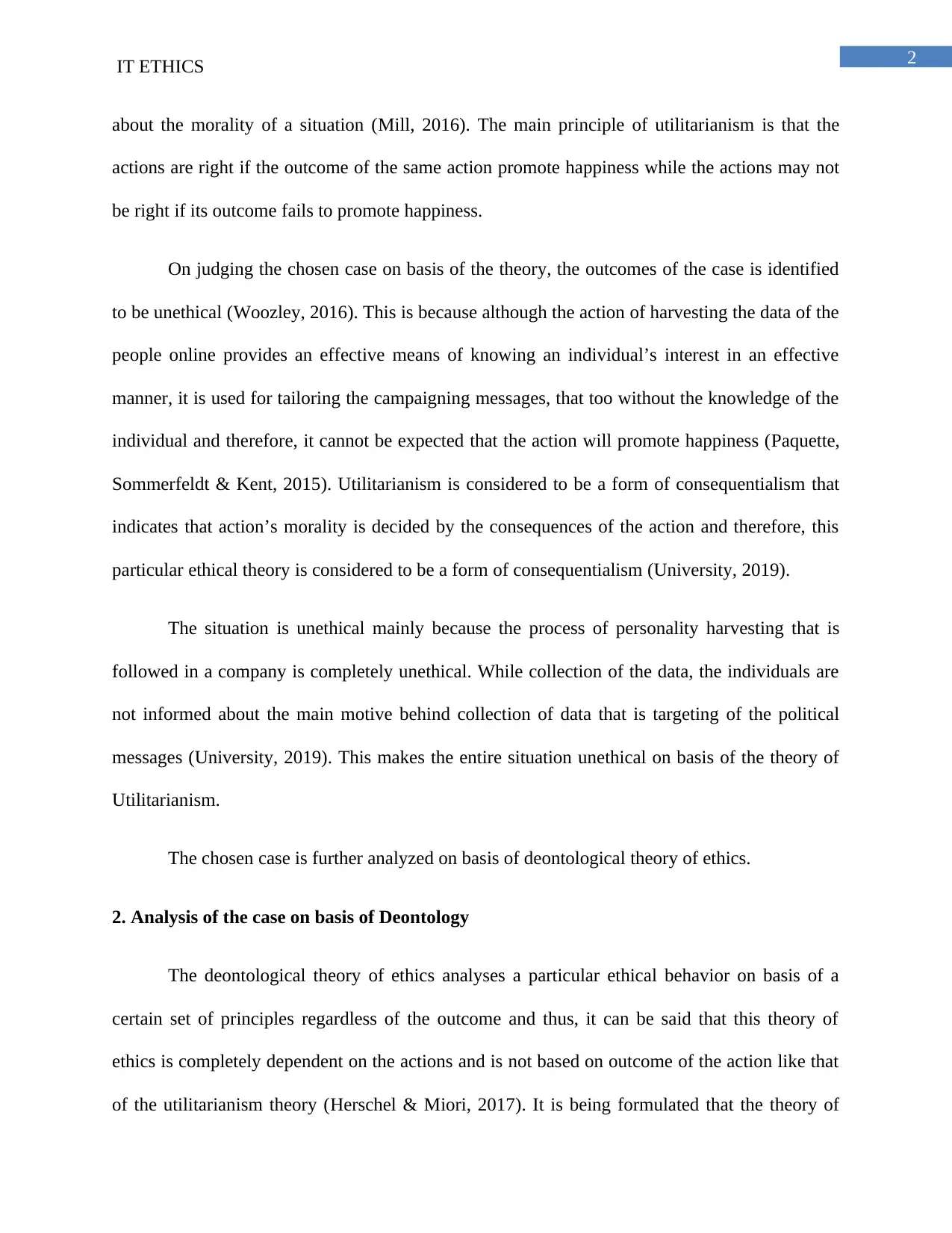
2IT ETHICS
about the morality of a situation (Mill, 2016). The main principle of utilitarianism is that the
actions are right if the outcome of the same action promote happiness while the actions may not
be right if its outcome fails to promote happiness.
On judging the chosen case on basis of the theory, the outcomes of the case is identified
to be unethical (Woozley, 2016). This is because although the action of harvesting the data of the
people online provides an effective means of knowing an individual’s interest in an effective
manner, it is used for tailoring the campaigning messages, that too without the knowledge of the
individual and therefore, it cannot be expected that the action will promote happiness (Paquette,
Sommerfeldt & Kent, 2015). Utilitarianism is considered to be a form of consequentialism that
indicates that action’s morality is decided by the consequences of the action and therefore, this
particular ethical theory is considered to be a form of consequentialism (University, 2019).
The situation is unethical mainly because the process of personality harvesting that is
followed in a company is completely unethical. While collection of the data, the individuals are
not informed about the main motive behind collection of data that is targeting of the political
messages (University, 2019). This makes the entire situation unethical on basis of the theory of
Utilitarianism.
The chosen case is further analyzed on basis of deontological theory of ethics.
2. Analysis of the case on basis of Deontology
The deontological theory of ethics analyses a particular ethical behavior on basis of a
certain set of principles regardless of the outcome and thus, it can be said that this theory of
ethics is completely dependent on the actions and is not based on outcome of the action like that
of the utilitarianism theory (Herschel & Miori, 2017). It is being formulated that the theory of
about the morality of a situation (Mill, 2016). The main principle of utilitarianism is that the
actions are right if the outcome of the same action promote happiness while the actions may not
be right if its outcome fails to promote happiness.
On judging the chosen case on basis of the theory, the outcomes of the case is identified
to be unethical (Woozley, 2016). This is because although the action of harvesting the data of the
people online provides an effective means of knowing an individual’s interest in an effective
manner, it is used for tailoring the campaigning messages, that too without the knowledge of the
individual and therefore, it cannot be expected that the action will promote happiness (Paquette,
Sommerfeldt & Kent, 2015). Utilitarianism is considered to be a form of consequentialism that
indicates that action’s morality is decided by the consequences of the action and therefore, this
particular ethical theory is considered to be a form of consequentialism (University, 2019).
The situation is unethical mainly because the process of personality harvesting that is
followed in a company is completely unethical. While collection of the data, the individuals are
not informed about the main motive behind collection of data that is targeting of the political
messages (University, 2019). This makes the entire situation unethical on basis of the theory of
Utilitarianism.
The chosen case is further analyzed on basis of deontological theory of ethics.
2. Analysis of the case on basis of Deontology
The deontological theory of ethics analyses a particular ethical behavior on basis of a
certain set of principles regardless of the outcome and thus, it can be said that this theory of
ethics is completely dependent on the actions and is not based on outcome of the action like that
of the utilitarianism theory (Herschel & Miori, 2017). It is being formulated that the theory of
⊘ This is a preview!⊘
Do you want full access?
Subscribe today to unlock all pages.

Trusted by 1+ million students worldwide
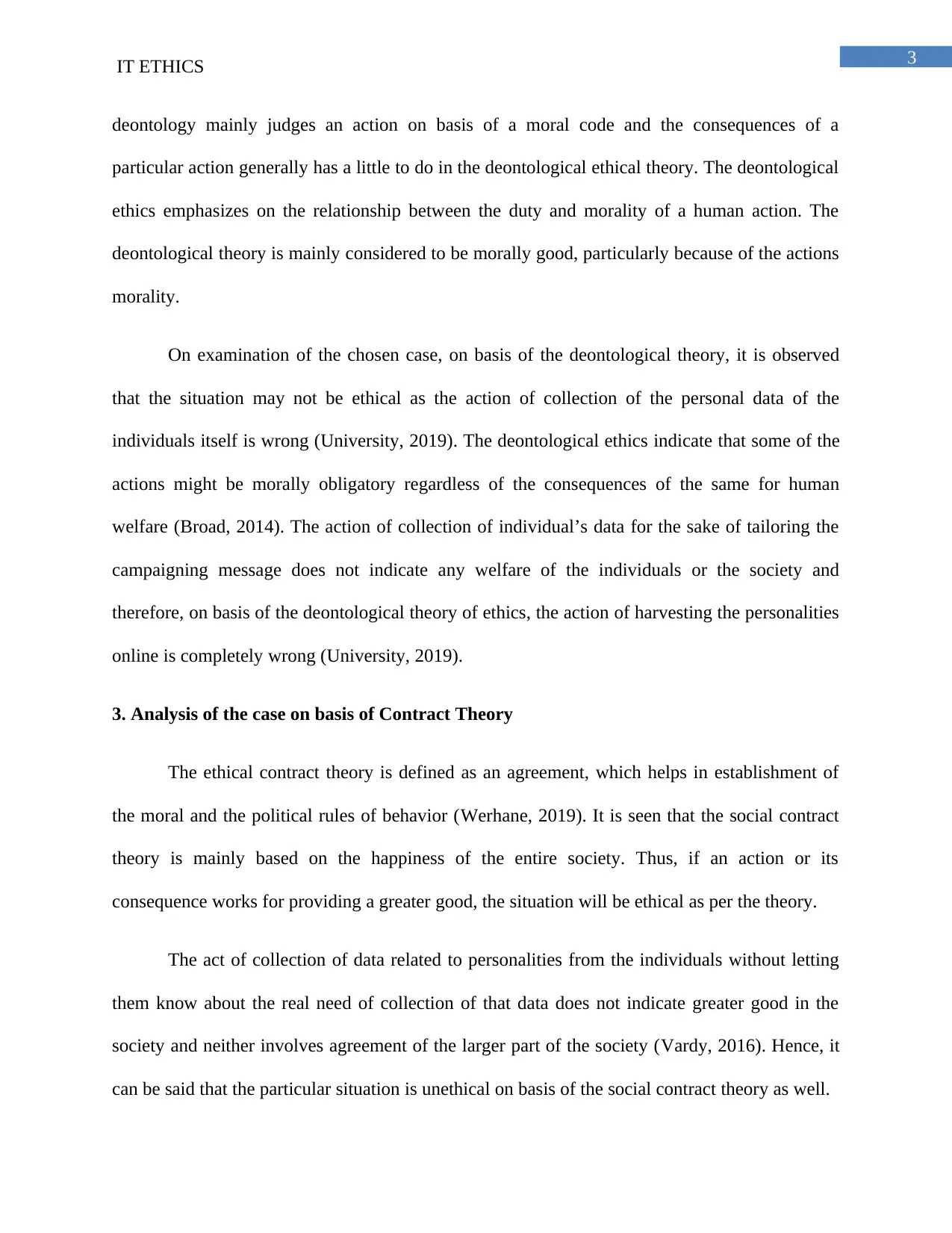
3IT ETHICS
deontology mainly judges an action on basis of a moral code and the consequences of a
particular action generally has a little to do in the deontological ethical theory. The deontological
ethics emphasizes on the relationship between the duty and morality of a human action. The
deontological theory is mainly considered to be morally good, particularly because of the actions
morality.
On examination of the chosen case, on basis of the deontological theory, it is observed
that the situation may not be ethical as the action of collection of the personal data of the
individuals itself is wrong (University, 2019). The deontological ethics indicate that some of the
actions might be morally obligatory regardless of the consequences of the same for human
welfare (Broad, 2014). The action of collection of individual’s data for the sake of tailoring the
campaigning message does not indicate any welfare of the individuals or the society and
therefore, on basis of the deontological theory of ethics, the action of harvesting the personalities
online is completely wrong (University, 2019).
3. Analysis of the case on basis of Contract Theory
The ethical contract theory is defined as an agreement, which helps in establishment of
the moral and the political rules of behavior (Werhane, 2019). It is seen that the social contract
theory is mainly based on the happiness of the entire society. Thus, if an action or its
consequence works for providing a greater good, the situation will be ethical as per the theory.
The act of collection of data related to personalities from the individuals without letting
them know about the real need of collection of that data does not indicate greater good in the
society and neither involves agreement of the larger part of the society (Vardy, 2016). Hence, it
can be said that the particular situation is unethical on basis of the social contract theory as well.
deontology mainly judges an action on basis of a moral code and the consequences of a
particular action generally has a little to do in the deontological ethical theory. The deontological
ethics emphasizes on the relationship between the duty and morality of a human action. The
deontological theory is mainly considered to be morally good, particularly because of the actions
morality.
On examination of the chosen case, on basis of the deontological theory, it is observed
that the situation may not be ethical as the action of collection of the personal data of the
individuals itself is wrong (University, 2019). The deontological ethics indicate that some of the
actions might be morally obligatory regardless of the consequences of the same for human
welfare (Broad, 2014). The action of collection of individual’s data for the sake of tailoring the
campaigning message does not indicate any welfare of the individuals or the society and
therefore, on basis of the deontological theory of ethics, the action of harvesting the personalities
online is completely wrong (University, 2019).
3. Analysis of the case on basis of Contract Theory
The ethical contract theory is defined as an agreement, which helps in establishment of
the moral and the political rules of behavior (Werhane, 2019). It is seen that the social contract
theory is mainly based on the happiness of the entire society. Thus, if an action or its
consequence works for providing a greater good, the situation will be ethical as per the theory.
The act of collection of data related to personalities from the individuals without letting
them know about the real need of collection of that data does not indicate greater good in the
society and neither involves agreement of the larger part of the society (Vardy, 2016). Hence, it
can be said that the particular situation is unethical on basis of the social contract theory as well.
Paraphrase This Document
Need a fresh take? Get an instant paraphrase of this document with our AI Paraphraser
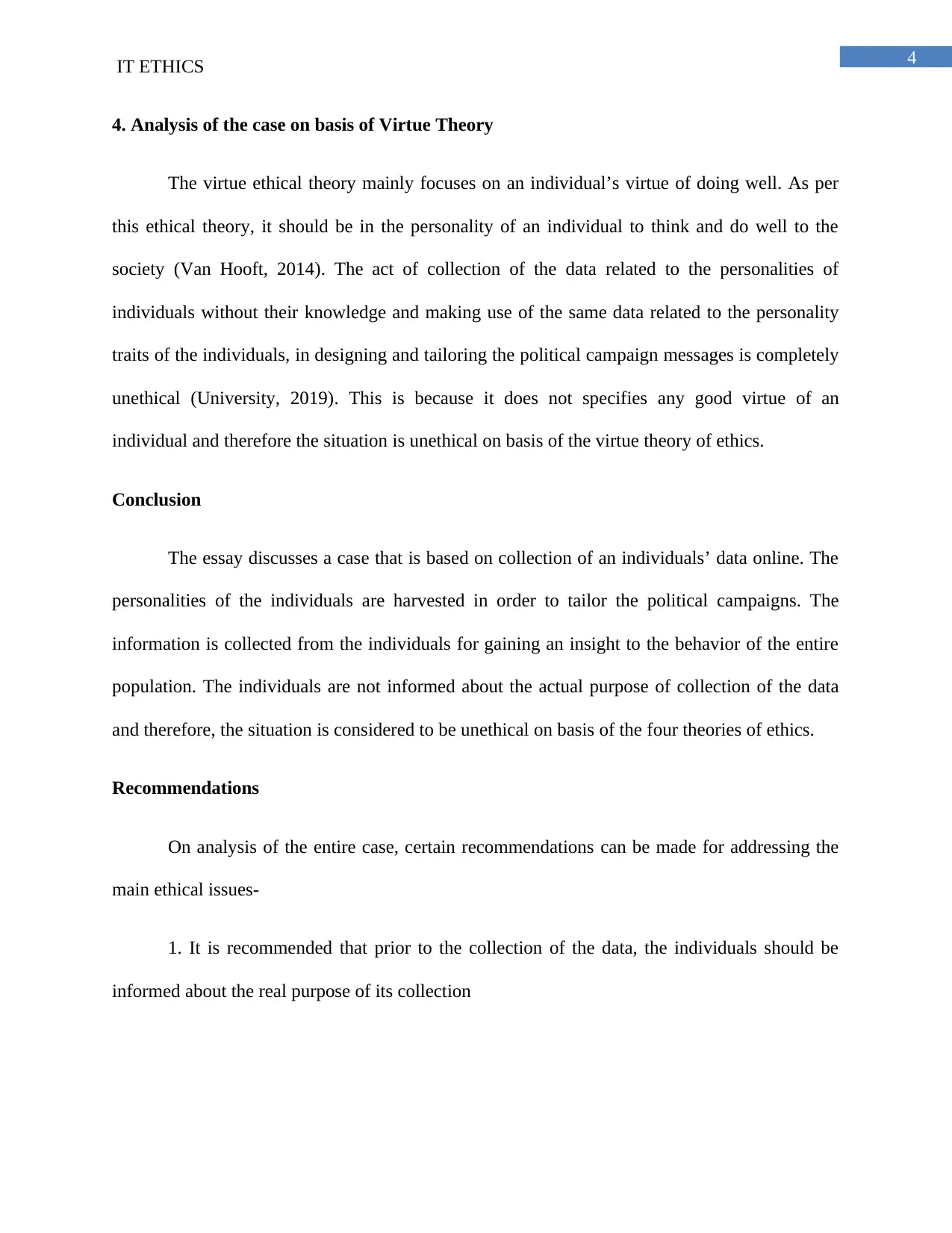
4IT ETHICS
4. Analysis of the case on basis of Virtue Theory
The virtue ethical theory mainly focuses on an individual’s virtue of doing well. As per
this ethical theory, it should be in the personality of an individual to think and do well to the
society (Van Hooft, 2014). The act of collection of the data related to the personalities of
individuals without their knowledge and making use of the same data related to the personality
traits of the individuals, in designing and tailoring the political campaign messages is completely
unethical (University, 2019). This is because it does not specifies any good virtue of an
individual and therefore the situation is unethical on basis of the virtue theory of ethics.
Conclusion
The essay discusses a case that is based on collection of an individuals’ data online. The
personalities of the individuals are harvested in order to tailor the political campaigns. The
information is collected from the individuals for gaining an insight to the behavior of the entire
population. The individuals are not informed about the actual purpose of collection of the data
and therefore, the situation is considered to be unethical on basis of the four theories of ethics.
Recommendations
On analysis of the entire case, certain recommendations can be made for addressing the
main ethical issues-
1. It is recommended that prior to the collection of the data, the individuals should be
informed about the real purpose of its collection
4. Analysis of the case on basis of Virtue Theory
The virtue ethical theory mainly focuses on an individual’s virtue of doing well. As per
this ethical theory, it should be in the personality of an individual to think and do well to the
society (Van Hooft, 2014). The act of collection of the data related to the personalities of
individuals without their knowledge and making use of the same data related to the personality
traits of the individuals, in designing and tailoring the political campaign messages is completely
unethical (University, 2019). This is because it does not specifies any good virtue of an
individual and therefore the situation is unethical on basis of the virtue theory of ethics.
Conclusion
The essay discusses a case that is based on collection of an individuals’ data online. The
personalities of the individuals are harvested in order to tailor the political campaigns. The
information is collected from the individuals for gaining an insight to the behavior of the entire
population. The individuals are not informed about the actual purpose of collection of the data
and therefore, the situation is considered to be unethical on basis of the four theories of ethics.
Recommendations
On analysis of the entire case, certain recommendations can be made for addressing the
main ethical issues-
1. It is recommended that prior to the collection of the data, the individuals should be
informed about the real purpose of its collection
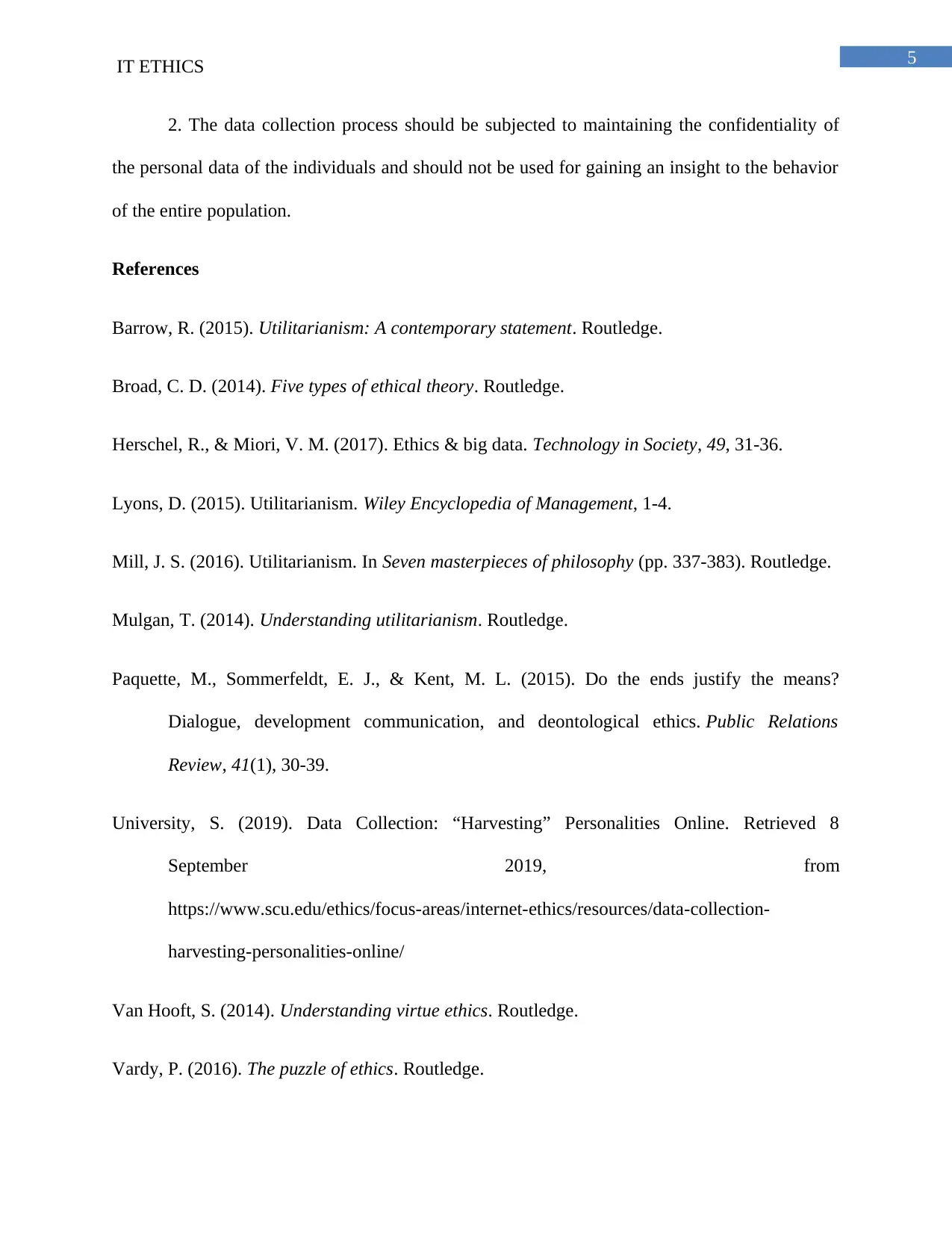
5IT ETHICS
2. The data collection process should be subjected to maintaining the confidentiality of
the personal data of the individuals and should not be used for gaining an insight to the behavior
of the entire population.
References
Barrow, R. (2015). Utilitarianism: A contemporary statement. Routledge.
Broad, C. D. (2014). Five types of ethical theory. Routledge.
Herschel, R., & Miori, V. M. (2017). Ethics & big data. Technology in Society, 49, 31-36.
Lyons, D. (2015). Utilitarianism. Wiley Encyclopedia of Management, 1-4.
Mill, J. S. (2016). Utilitarianism. In Seven masterpieces of philosophy (pp. 337-383). Routledge.
Mulgan, T. (2014). Understanding utilitarianism. Routledge.
Paquette, M., Sommerfeldt, E. J., & Kent, M. L. (2015). Do the ends justify the means?
Dialogue, development communication, and deontological ethics. Public Relations
Review, 41(1), 30-39.
University, S. (2019). Data Collection: “Harvesting” Personalities Online. Retrieved 8
September 2019, from
https://www.scu.edu/ethics/focus-areas/internet-ethics/resources/data-collection-
harvesting-personalities-online/
Van Hooft, S. (2014). Understanding virtue ethics. Routledge.
Vardy, P. (2016). The puzzle of ethics. Routledge.
2. The data collection process should be subjected to maintaining the confidentiality of
the personal data of the individuals and should not be used for gaining an insight to the behavior
of the entire population.
References
Barrow, R. (2015). Utilitarianism: A contemporary statement. Routledge.
Broad, C. D. (2014). Five types of ethical theory. Routledge.
Herschel, R., & Miori, V. M. (2017). Ethics & big data. Technology in Society, 49, 31-36.
Lyons, D. (2015). Utilitarianism. Wiley Encyclopedia of Management, 1-4.
Mill, J. S. (2016). Utilitarianism. In Seven masterpieces of philosophy (pp. 337-383). Routledge.
Mulgan, T. (2014). Understanding utilitarianism. Routledge.
Paquette, M., Sommerfeldt, E. J., & Kent, M. L. (2015). Do the ends justify the means?
Dialogue, development communication, and deontological ethics. Public Relations
Review, 41(1), 30-39.
University, S. (2019). Data Collection: “Harvesting” Personalities Online. Retrieved 8
September 2019, from
https://www.scu.edu/ethics/focus-areas/internet-ethics/resources/data-collection-
harvesting-personalities-online/
Van Hooft, S. (2014). Understanding virtue ethics. Routledge.
Vardy, P. (2016). The puzzle of ethics. Routledge.
⊘ This is a preview!⊘
Do you want full access?
Subscribe today to unlock all pages.

Trusted by 1+ million students worldwide
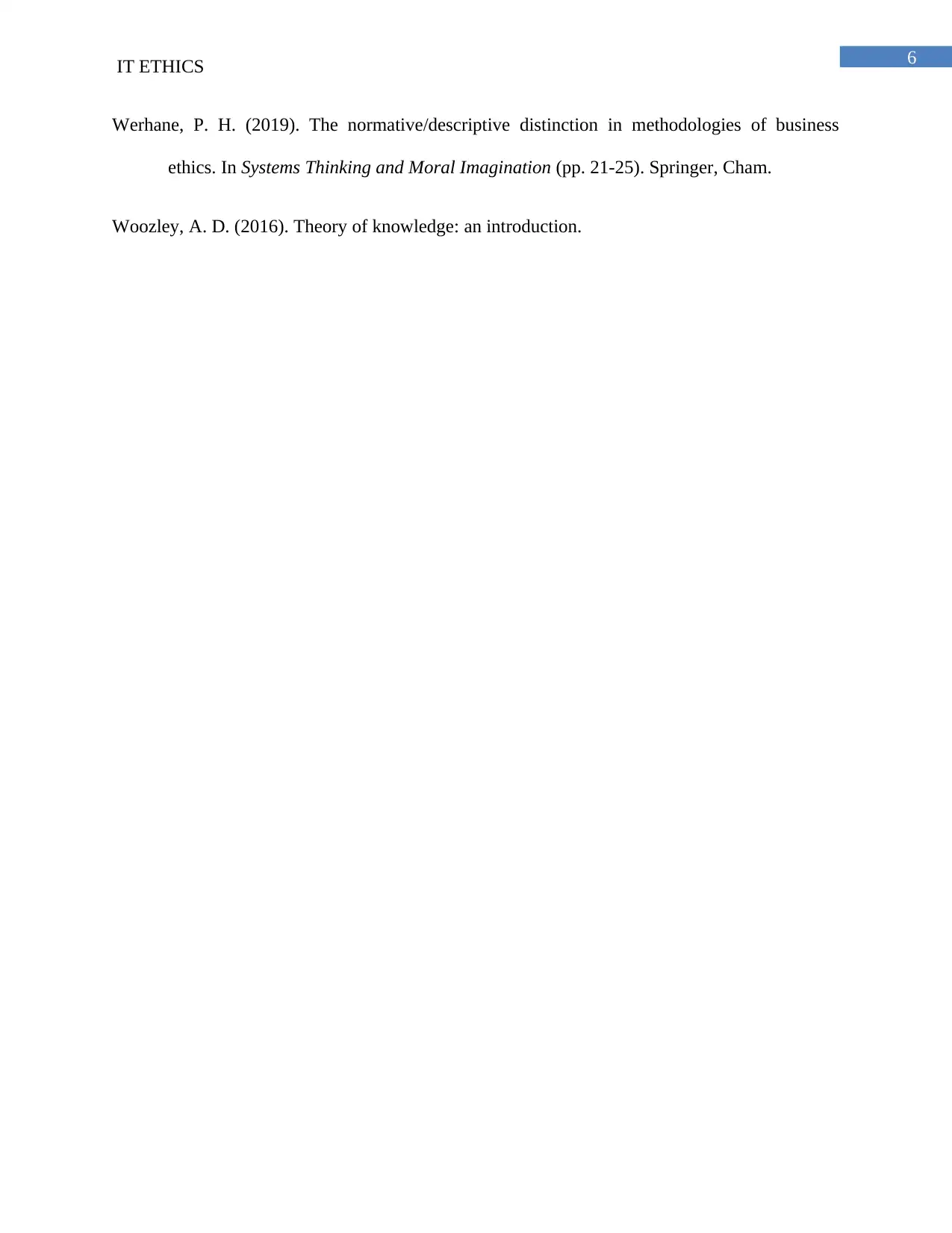
6IT ETHICS
Werhane, P. H. (2019). The normative/descriptive distinction in methodologies of business
ethics. In Systems Thinking and Moral Imagination (pp. 21-25). Springer, Cham.
Woozley, A. D. (2016). Theory of knowledge: an introduction.
Werhane, P. H. (2019). The normative/descriptive distinction in methodologies of business
ethics. In Systems Thinking and Moral Imagination (pp. 21-25). Springer, Cham.
Woozley, A. D. (2016). Theory of knowledge: an introduction.
1 out of 7
Related Documents
Your All-in-One AI-Powered Toolkit for Academic Success.
+13062052269
info@desklib.com
Available 24*7 on WhatsApp / Email
![[object Object]](/_next/static/media/star-bottom.7253800d.svg)
Unlock your academic potential
Copyright © 2020–2026 A2Z Services. All Rights Reserved. Developed and managed by ZUCOL.





